Knowledge-augmented agents with LlamaIndex.TS
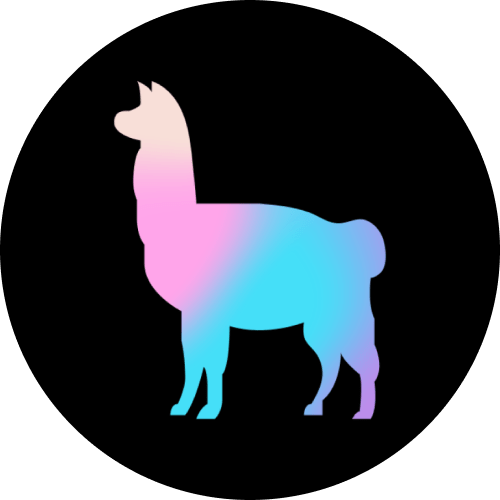
2025-04-21 Microsoft AI Agents Hackathon
What are we talking about?
- What is LlamaIndex
- What is an Agent?
- What is RAG?
- Common agentic Patterns
- Building agentic RAG in LlamaIndex.TS
- Chaining
- Routing
- Parallelization
- Self-reflection
- Full stack web app
- ...with agents
- ...with RAG!
What is LlamaIndex?
Python: docs.llamaindex.ai
TypeScript: ts.llamaindex.ai
LlamaParse
World's best parser of complex documents
Free for 10000 pages/month!
cloud.llamaindex.ai
LlamaCloud
Turn-key RAG API for Enterprises
Available as SaaS or private cloud deployment
Sign up at cloud.llamaindex.ai
Why LlamaIndex?
- Build faster
- Skip the boilerplate
- Avoid early pitfalls
- Get best practices for free
- Go from prototype to production
What can you build in LlamaIndex?
- Lots of stuff! Especially...
- AI agents
- RAG
What is an agent?
Semi-autonomous software
that uses tools to accomplish a goal
Agentic programming is a new paradigm
When does an agent make sense?
When your data is messy, which is most of the time
LLMs are good at turning lots of text into less text
LLMs work well under the hood
You don't have to build a chatbot
LLMs need data
The solution is RAG
RAG = infinite context

Agents need RAG
and RAG needs agents
Building Effective Agents
- Chaining
- Routing
- Parallelization
- Orchestrator-Workers
- Evaluator-Optimizer
Chaining
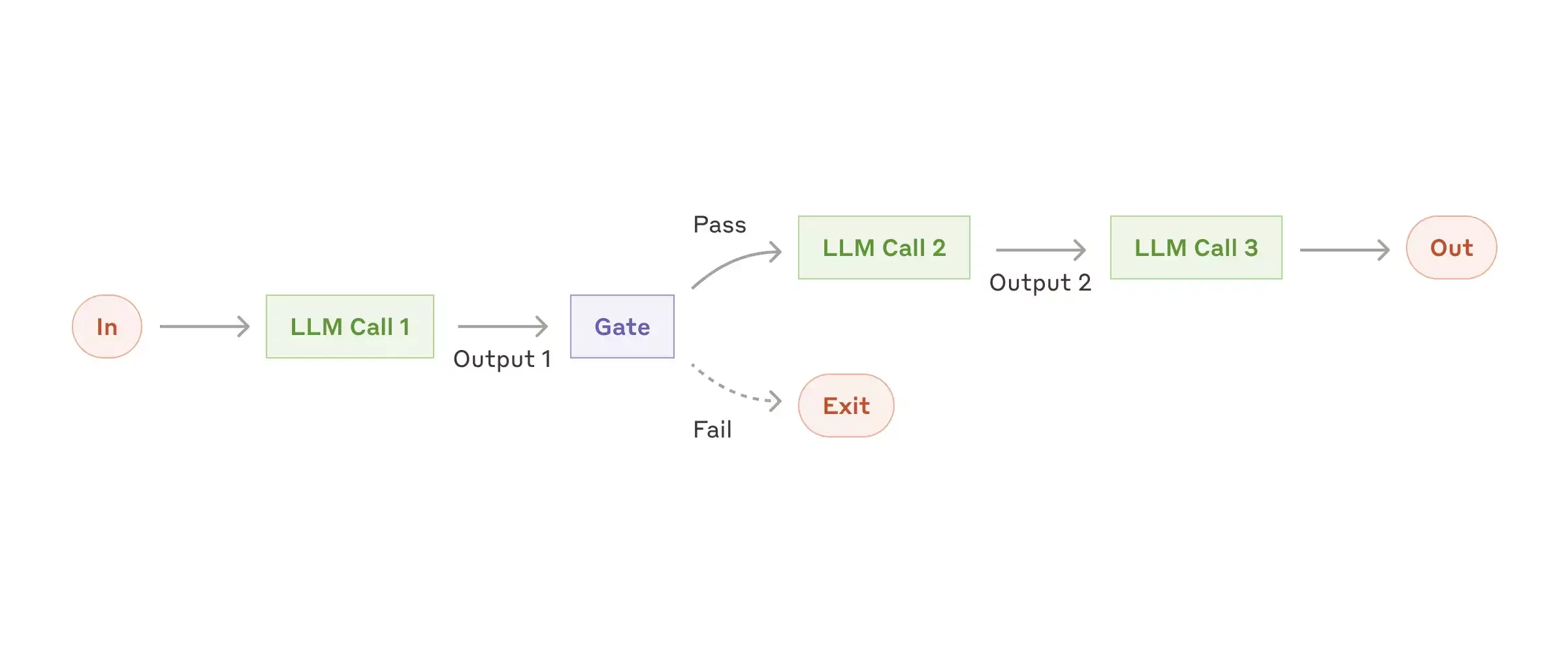
Routing
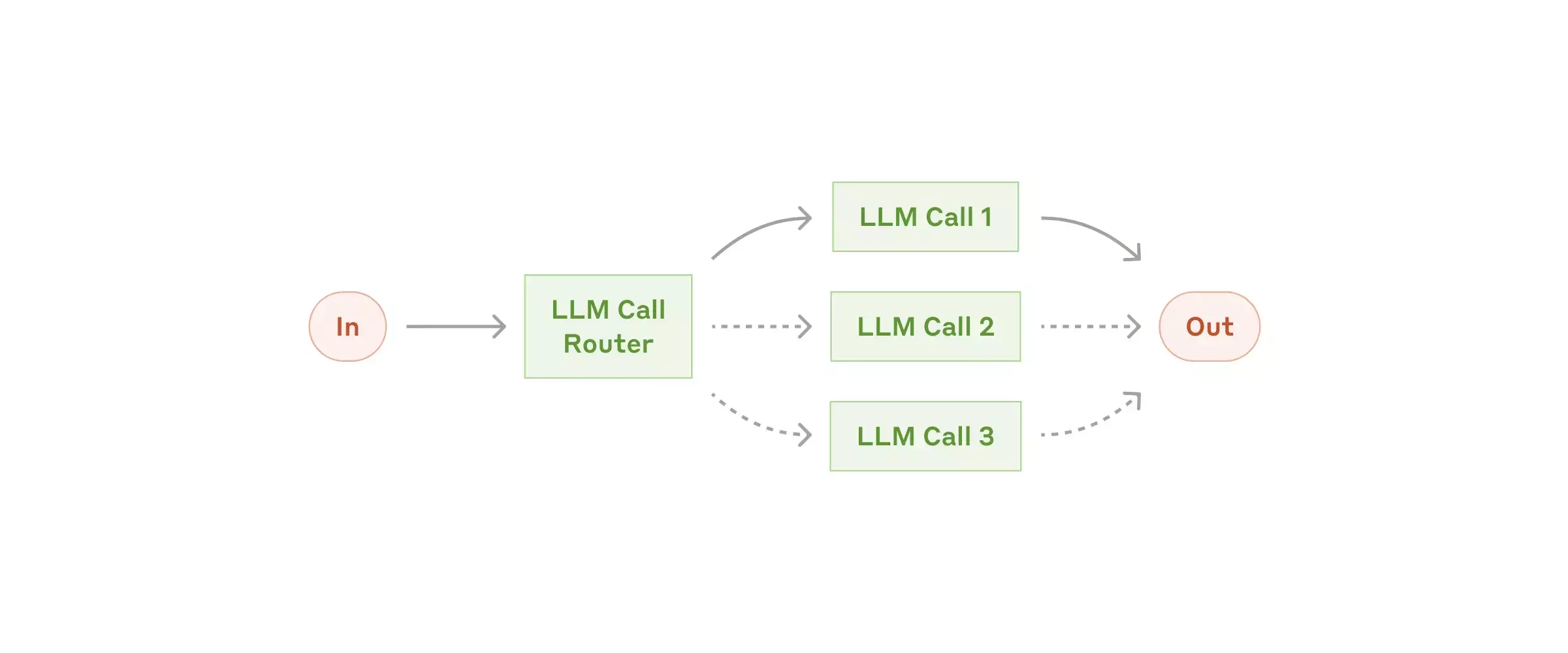
Parallelization
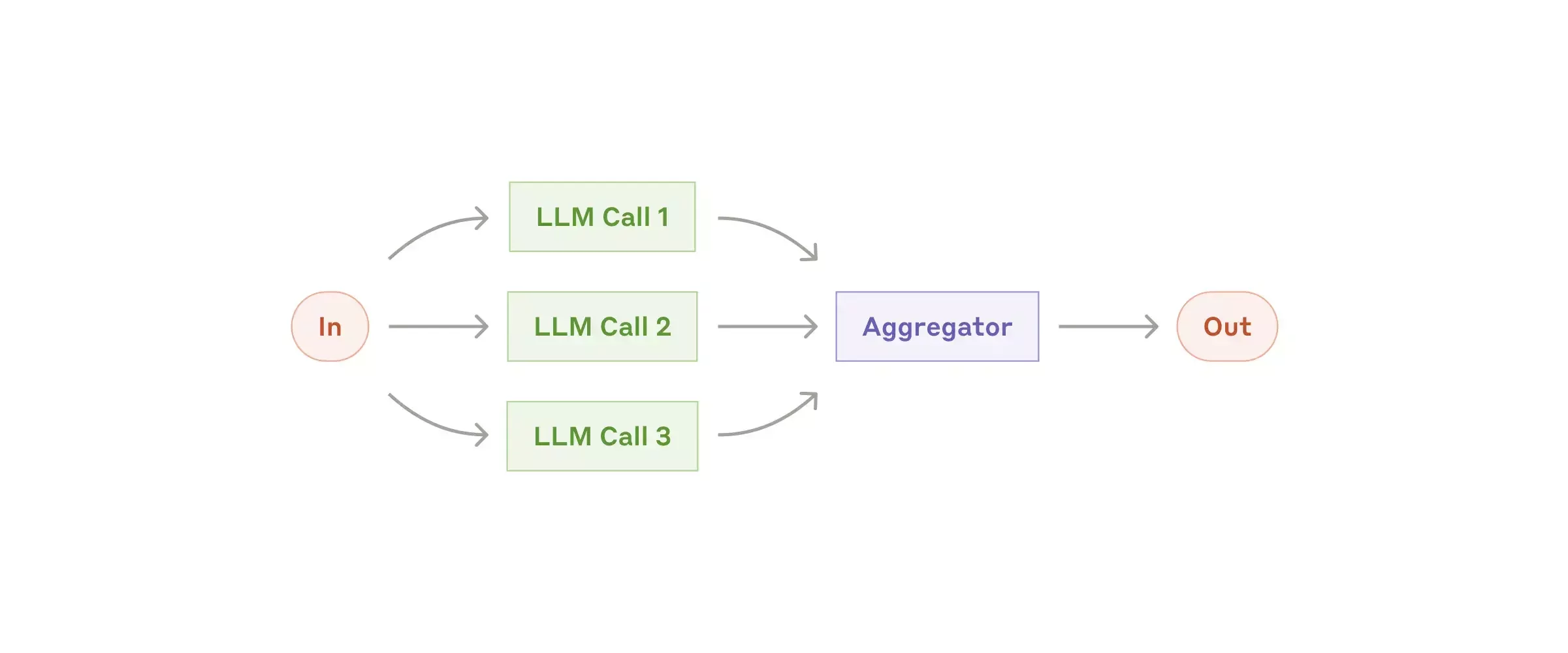
Sectioning

Parallelization: flavor 1
Voting

Parallelization: flavor 2
Orchestrator-Workers
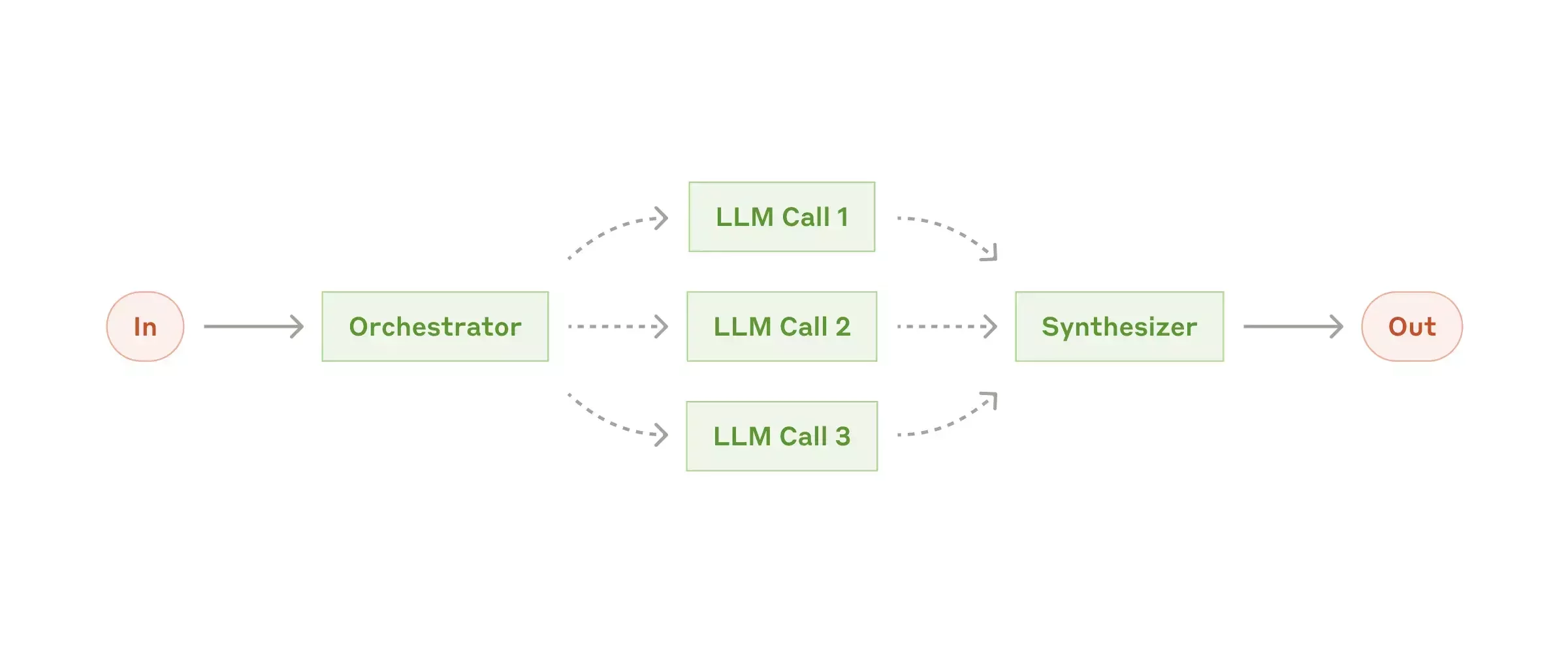
Evaluator-Optimizer
aka Self-reflection
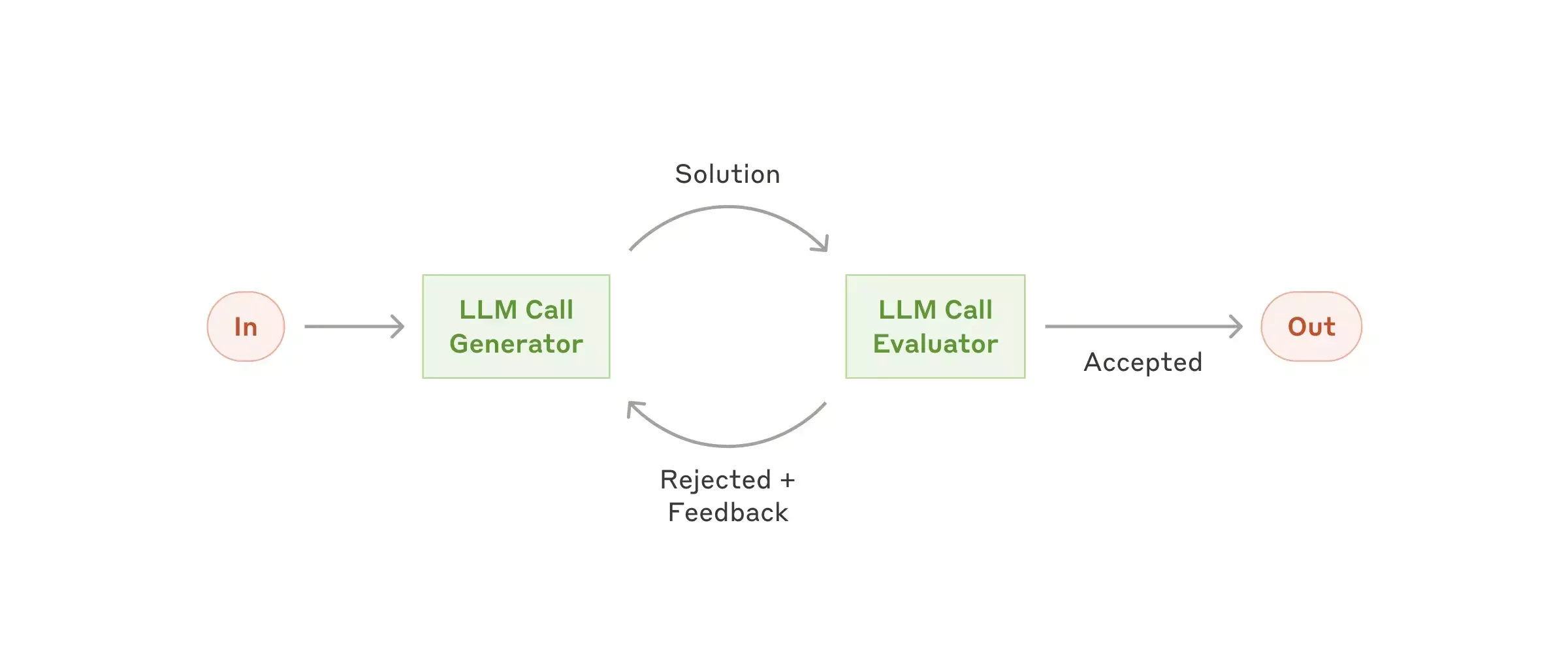
Arbitrary complexity
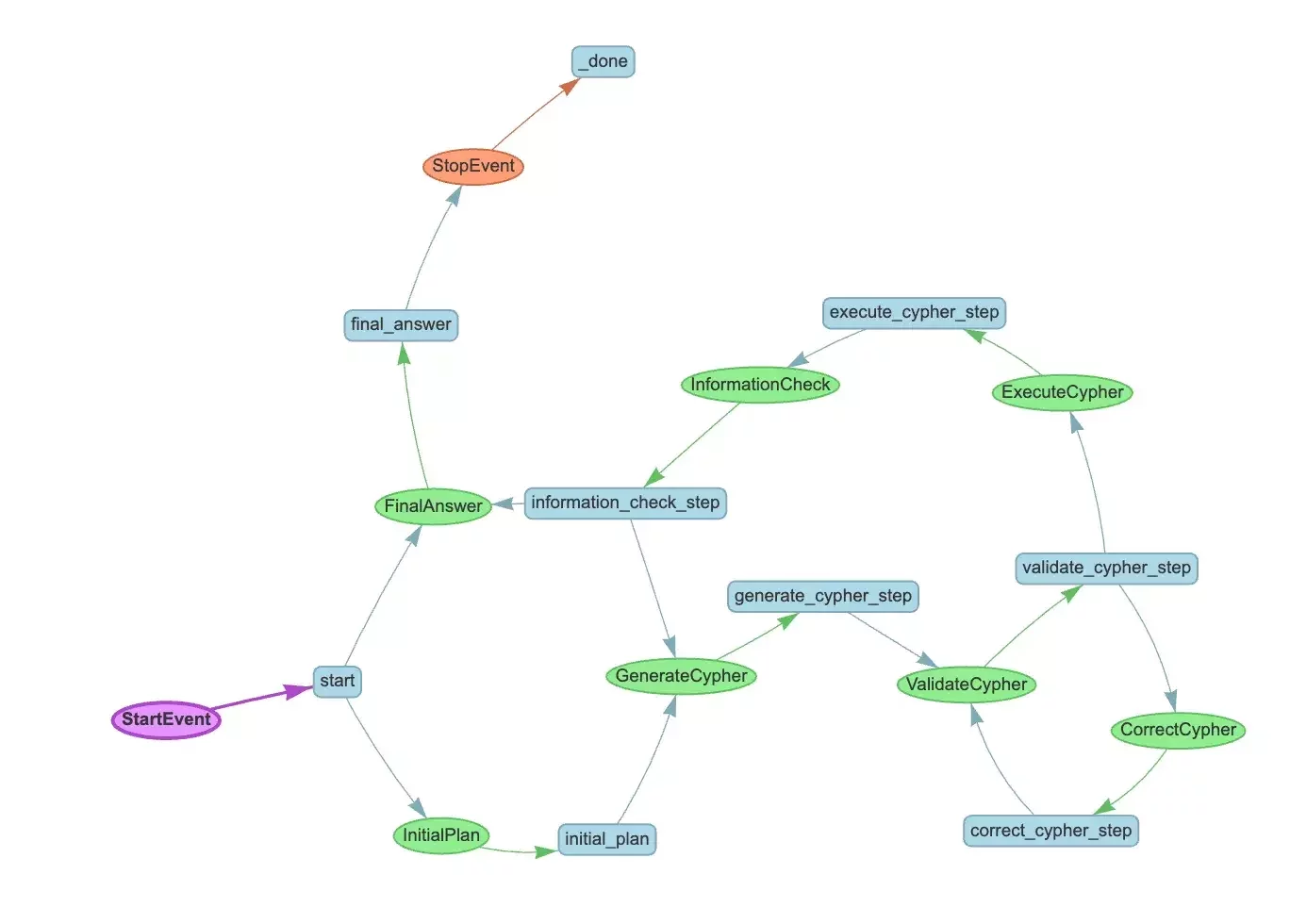
Workflows
The building blocks of agents in LlamaIndex
Example repo
Setting up
npm install tsx -g
npm install @llama-flow/coreInstall:
{
"type": "module"
}
package.json:
import { createWorkflow, workflowEvent } from "@llama-flow/core";
import { pipeline } from "node:stream/promises"; Imports:
tsx my_file.tsRun examples:
Define events,
create workflow
const startEvent = workflowEvent<string>();
const secondEvent = workflowEvent<string>();
const stopEvent = workflowEvent<string>();
const workflow = createWorkflow();
Create step handlers
// handle the start event
workflow.handle([startEvent], (start) => {
console.log(`Started the workflow with input: ${start.data}`);
return secondEvent.with(start.data);
});
// handle the second event
workflow.handle([secondEvent], (second) => {
console.log(`Second event with input: ${second.data}`);
return stopEvent.with(second.data);
});
Running a workflow
const { stream, sendEvent } = workflow.createContext();
sendEvent(startEvent.with("I am some data"));
Processing workflow output
// Process the stream to get the result
const result = await pipeline(stream, async function (source) {
for await (const event of source) {
console.log(`Event: ${event.data}`);
if (stopEvent.include(event)) {
return `Result: ${event.data}`;
}
}
});
console.log(result)Routing
const startEvent = workflowEvent<string>();
const branchA1Event = workflowEvent<string>();
const branchA2Event = workflowEvent<string>();
const branchB1Event = workflowEvent<string>();
const branchB2Event = workflowEvent<string>();
const stopEvent = workflowEvent<string>();
Choosing a branch
workflow.handle([startEvent], (start) => {
// Randomly choose between branch A and B
if (Math.random() < 0.5) {
return branchA1Event.with("Chose branch A");
} else {
return branchB1Event.with("Chose branch B");
}
});
Two chains
// handle branch A
workflow.handle([branchA1Event], (branchA1) => {
return branchA2Event.with(branchA1.data);
});
workflow.handle([branchA2Event], (branchA2) => {
return stopEvent.with(branchA2.data);
});
// handle branch B
workflow.handle([branchB1Event], (branchB1) => {
return branchB2Event.with(branchB1.data);
});
workflow.handle([branchB2Event], (branchB2) => {
return stopEvent.with(branchB2.data);
});
Sectioning
import { collect } from "@llama-flow/core/stream/consumer";
import { until } from "@llama-flow/core/stream/until";
import { filter } from "@llama-flow/core/stream/filter";
import { getContext } from "@llama-flow/core";
Sectioning events
const startEvent = workflowEvent<string>();
const branchAEvent = workflowEvent<string>();
const branchBEvent = workflowEvent<string>();
const branchCEvent = workflowEvent<string>();
const branchCompleteEvent = workflowEvent<string>();
const allCompleteEvent = workflowEvent<string>();
const stopEvent = workflowEvent<string>();
Emitting multiple events
workflow.handle([startEvent], async (start) => {
// emit 3 different events, handled separately
const { sendEvent, stream } = getContext();
sendEvent(branchAEvent.with("Branch A"));
sendEvent(branchBEvent.with("Branch B"));
sendEvent(branchCEvent.with("Branch C"));
Sectioning steps
workflow.handle([branchAEvent], (branchA) => {
// do something here
return branchCompleteEvent.with(branchA.data);
});
Collecting events
let condition = 0;
const results = await collect(
until(
filter(stream, (ev) => branchCompleteEvent.include(ev)),
() => {
condition++;
return condition === 3;
},
),
);
console.log(`All branches completed`);
return allCompleteEvent.with(results.join(", "));
});Voting
is implemented the same way as sectioning
Using an LLM
import { config } from 'dotenv';
config({ path: '.env.local' });
Imports for .env.local:
ANTHROPIC_API_KEY=xxxxxIn .env.local:
import { Anthropic } from "@llamaindex/anthropic";Imports for Anthropic:
Orchestrator-worker
const startEvent = workflowEvent<string>();
const subquestionEvent = workflowEvent<string>();
const questionAnsweredEvent = workflowEvent<string>();
const synthesizeEvent = workflowEvent<string>();
const stopEvent = workflowEvent<string>();
Initialize the LLM
// initialize the LLM
const llm = new Anthropic({
apiKey: process.env.ANTHROPIC_API_KEY,
});
Split up the question
let prompt = `We have been ask a complicated question:
<question>${start.data}</question>.
Split it up into a few different questions
that are easier to answer.
Return the questions with one question per line.
Do not include any other text, preamble or
explanation in your response.
`
let result = await llm.complete({prompt:prompt})
// split up the result into an array of questions
let questions = result.text.split("\n")
.map(q => q.trim())
.filter(q => q !== "");
Answering each question
workflow.handle([subquestionEvent], async (subquestion) => {
console.log(`Answering sub-question: ${subquestion.data}`);
let prompt = `Answer the question:
<question>${subquestion.data}</question>.
Return the answer as a short answer.
`
let result = await llm.complete({prompt:prompt})
console.log(`Answer: ${result.text}`);
return questionAnsweredEvent.with(result.text)
});
Emitting and collecting
// emit the questions
const { sendEvent, stream } = getContext();
for (let question of questions) {
sendEvent(subquestionEvent.with(question));
}
// get all the answers to the questions
let condition = 0;
const results = await collect(
until(
filter(stream, (ev) => questionAnsweredEvent.include(ev)),
() => {
condition++;
return condition === questions.length;
},
),
);
Bundling answers
let answers = results.map(r => r.data)
return synthesizeEvent.with({
answers: answers.join("\n"),
question: start.data
});
Synthesis
// handle the collected results
workflow.handle([synthesizeEvent], async (synthesize) => {
let prompt = `You were given the complicated question
${synthesize.data.question}.
We split it into multiple simpler questions.
The answers to the questions are:
<answers>${synthesize.data.answers}</answers>.`
let result = await llm.complete({prompt:prompt})
return stopEvent.with(result.text);
});
Evaluator-optimizer
aka Self-reflection
Looping syntax
workflow.handle([stepCEvent], async (stepC) => {
console.log("Step C, data is ", stepC.data)
if (stepC.data.counter < 10) {
console.log("Need to loop")
return stepAEvent.with(stepC.data);
} else {
return stopEvent.with(stepC.data);
}
});
Real-world web apps
Setting up
npx create-next-appCreate next.js app:
In repo:
7_browser/src/app/page.tsx
Repo location reminder:
Basic React app
const [updates, setUpdates] = useState([]);
const [isComplete, setIsComplete] = useState(false);
...
return (
<div>
<h2>Streaming Updates</h2>
<ul>
{updates.map((update, i) => (
<li key={i}>{update}</li>
))}
</ul>
{isComplete && <div>Process complete!</div>}
</div>
);
In-browser workflow
const startEvent = workflowEvent<void>();
const updateEvent = workflowEvent<string>();
const completeEvent = workflowEvent<void>();
const workflow = createWorkflow();
Synthetic events
// Simulate async updates
const intervals = [
setTimeout(() => sendEvent(updateEvent.with("First update")), 500),
setTimeout(() => sendEvent(updateEvent.with("Second update")), 1000),
setTimeout(() => sendEvent(updateEvent.with("Final update")), 1500),
setTimeout(() => sendEvent(completeEvent.with()), 2000)
];
Handling streams in browser
// Process events
const processEvents = async () => {
for await (const event of stream) {
if (updateEvent.include(event)) {
setUpdates(prev => [...prev, event.data]);
} else if (completeEvent.include(event)) {
setIsComplete(true);
break;
}
}
};
Server-side full-stack React app
In repo:
8_server/src/app/page.tsx
8_server/src/app/api/run-workflow/route.ts
Repo location reminder:
Client-side code
useEffect(() => {
const eventSource = new EventSource('/api/run-workflow');
eventSource.onmessage = (event) => {
console.log("Got a new event", event.data)
setEvents(prev => [...prev, event.data]);
};
eventSource.onerror = () => {
eventSource.close();
};
return () => {
eventSource.close();
};
}, []);
Endpoint route
export async function GET() {
const encoder = new TextEncoder();
const stream = new ReadableStream({
async start(controller) {
// everything happens here
},
});
return new NextResponse(stream, {
headers: {
'Content-Type': 'text/event-stream',
'Cache-Control': 'no-cache',
'Connection': 'keep-alive',
},
});
}
Event sources
// Send initial connection message
controller.enqueue(
encoder.encode('data: Connected to workflow\n\n')
);
// initialize the anthropic client
const llm = new Anthropic({
apiKey: process.env.ANTHROPIC_API_KEY,
});
Architecture
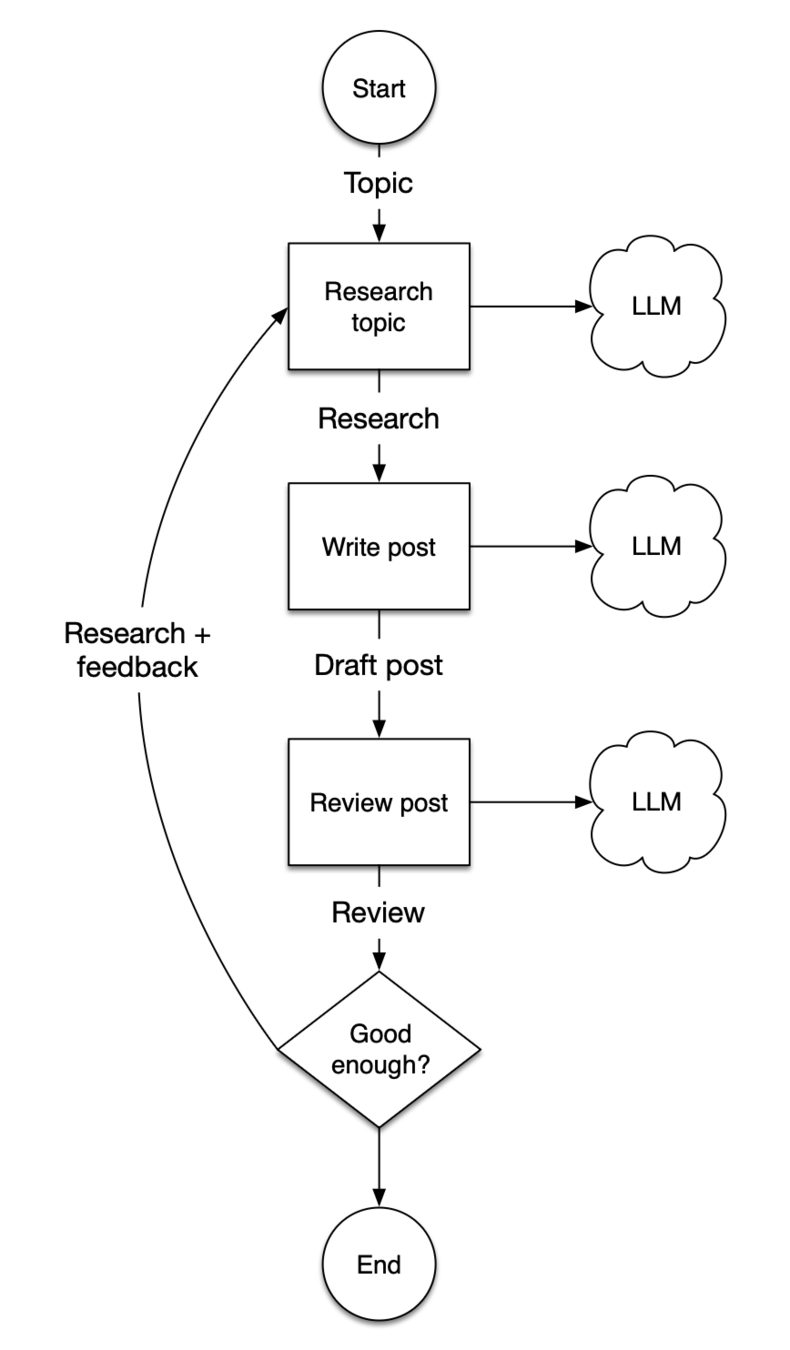
Events
const startEvent = workflowEvent<{
topic:string|null,
research:string,
feedback:string|null
}>();
const writeEvent = workflowEvent<string>();
const reviewEvent = workflowEvent<string>();
const stopEvent = workflowEvent<string>();
Context store
import { withStore } from "@llama-flow/core/middleware/store";
const workflow = withStore(()=>({
topic: null as string | null,
research: "" as string,
feedback: null as string | null
}),createWorkflow());
Researching
workflow.handle([startEvent], async (start) => {
// store the topic in case we need to loop
workflow.getStore().topic = start.data.topic
let prompt = `What do you know about the topic
<topic>${start.data.topic}</topic>? Be very brief.`
// if we've previously looped, include the feedback
if (start.data.feedback) {
prompt += `\nYou have researched this topic before.
The feedback you got to research it more is:
<feedback>${start.data.feedback}</feedback>`
}
// get the research
let result = await llm.complete({prompt:prompt})
return writeEvent.with(result.text)
});
Writing
// with the research, store it and try writing a post
workflow.handle([writeEvent], async (write) => {
console.log(`Writing post, data is ${write.data}`)
// store the research; this may not be the first time around
workflow.getStore().research += `<research>${write.data}</research>`
// try writing a post
let result = await llm.complete({prompt:`We have done some
research about a topic. Write a post about it. Use ONLY
the research data provided, nothing from your training
data, even if that results in a very short post.
${workflow.getStore().research}`})
return reviewEvent.with(result.text)
});
Reflecting
// review the post
let result = await llm.complete({
prompt:`We have written a post about a topic.
Review it for any errors or missing information.
<post>${review.data}</post>. If it is good, return
the string "good". If it requires more research,
return some feedback on what to research next.`})
// if the post is good, stop
if (result.text === "good") {
return stopEvent.with(review.data)
} else {
// otherwise, loop with the feedback
return startEvent.with({
topic: workflow.getStore().topic,
research: workflow.getStore().research,
feedback: result.text
})
}
Running the workflow
// Process the stream to get the result
pipeline(stream, async function (source) {
for await (const event of source) {
console.log("Got a new event", event.data)
controller.enqueue(
encoder.encode("data: " + JSON.stringify(event.data)+"\n\n"));
if (stopEvent.include(event)) {
controller.close();
}
}
});
Recap!
- Agentic patterns
- Implemented as Workflows
- In a browser
- On a server
Adding agents
Wait, weren't we building agents already?
Setting up
npm install llamaindexInstall:
New imports:
import {
agent,
tool,
Settings,
} from "llamaindex";
import { z } from "zod";Creating a tool
const sumNumbers = ({ a, b }) => {
return `${a + b}`;
};
Preparing a tool
const addTool = tool({
name: "sumNumbers",
description: "Use this function to sum two numbers",
parameters: z.object({
a: z.number({
description: "First number to sum",
}),
b: z.number({
description: "Second number to sum",
}),
}),
execute: sumNumbers,
});
Instantiate an agent
Settings.llm = new Anthropic({
apiKey: process.env.ANTHROPIC_API_KEY,
model: "claude-3-7-sonnet-latest",
});
const tools = [addTool];
const myAgent = agent({ tools });
Agents in a workflow
// handle the start event
workflow.handle([startEvent], async (start) => {
console.log(`Started the workflow
with question: ${start.data}`);
const response = await myAgent.run(start.data);
return stopEvent.with(response.data.result);
});
Basic RAG pipeline

Setting up
npm install @llamaindex/huggingface
npm install @llamaindex/readersInstall:
New imports:
import VectorStoreIndex from "llamaindex";
import { HuggingFaceEmbedding } from "@llamaindex/huggingface";
import { SimpleDirectoryReader } from "@llamaindex/readers/directory";
Loading
const reader = new SimpleDirectoryReader();
const documents = await reader.loadData("./data");Embedding
Settings.embedModel = new HuggingFaceEmbedding({
modelType: "BAAI/bge-small-en-v1.5",
quantized: false,
});
Storing
const index = await VectorStoreIndex.fromDocuments(documents);Using a vector store:
Retrieving
const retriever = await index.asRetriever();
retriever.similarityTopK = 10;
Creating a query tool
const queryTool = index.queryTool({
metadata: {
name: "san_francisco_budget_tool",
description: `This tool can answer detailed questions
about the individual components of the budget of
San Francisco in 2023-2024.`,
},
retriever: retriever,
})
Giving RAG to an agent
const tools = [addTool, queryTool];
const myAgent = agent({ tools });
Wow!
What can't it do? Well...
RAG limitations
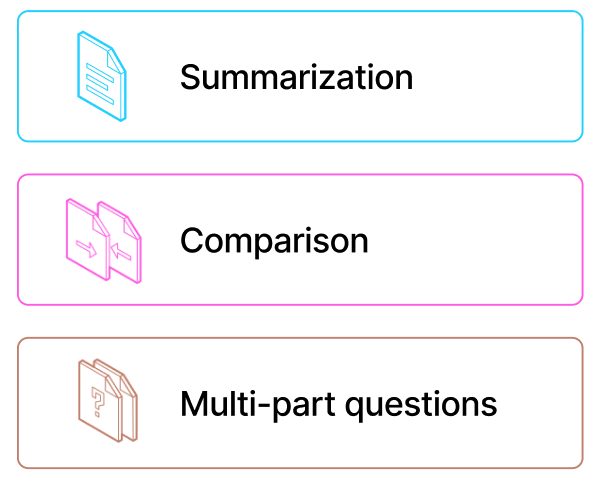
Summarization
Solve it with: routing, parallelization
Comparison
Solve it with: parallelization
Multi-part questions
Solve it with: chaining, parallelization
What's next?

More workflow docs:
That repo again:
Thanks!
Follow me on BlueSky:
@seldo.com

Knowledge-augmented agents with LlamaIndex.TS (Microsoft)
By Laurie Voss
Knowledge-augmented agents with LlamaIndex.TS (Microsoft)
- 868



